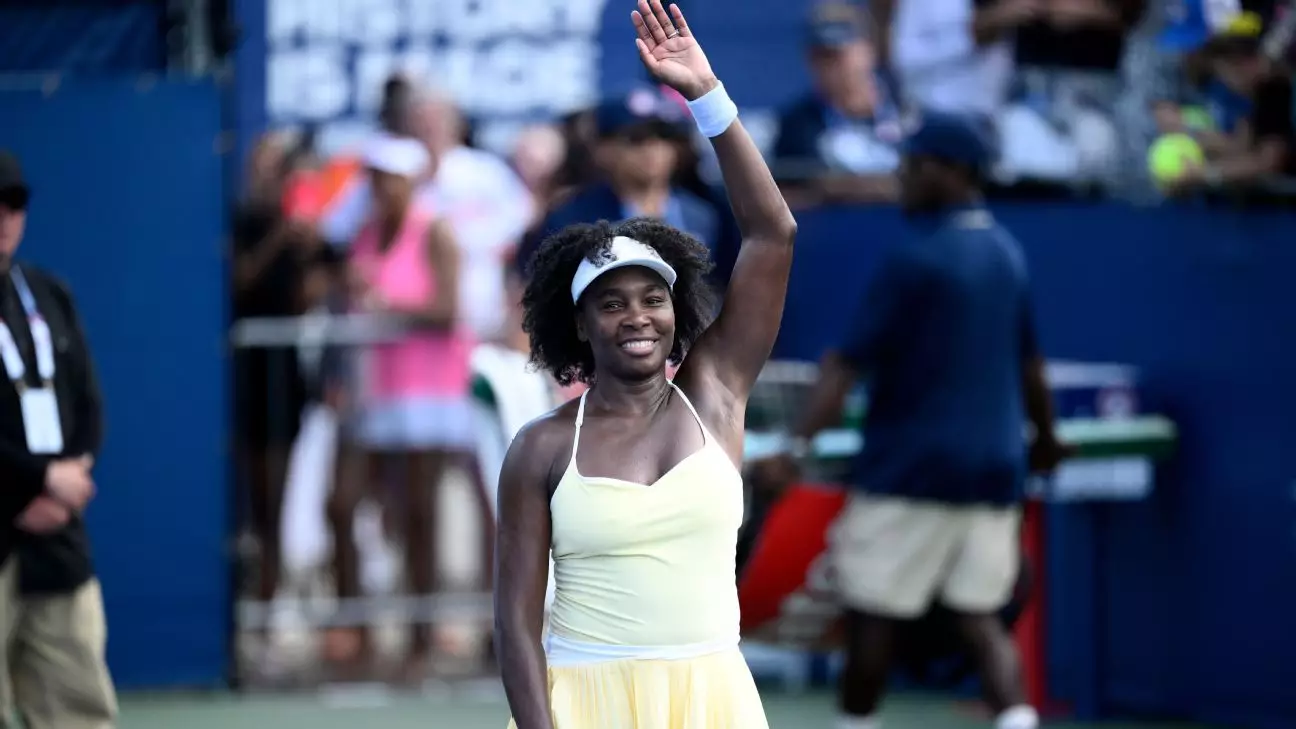Venus Williams’s recent appearance at the DC Open marks a significant milestone not only for her but for the sport itself. After over a year away from competitive play and nearly three years since her last doubles match, her return embodies resilience, passion, and unwavering dedication. Her first serve at the tournament—powerful, commanding, and symbolically strong—set the tone for her journey back into high-level tennis. Despite an initial foot-fault call that nullified her opening strike, her reaction was a testament to her seasoned perspective; she smiled and carried on, refusing to let minor setbacks dampen her spirit. Such moments underscore the mental fortitude that has defined her career, transcending age and physical challenges.
This comeback isn’t merely about returning to the court; it’s about reclaiming a part of herself that has endured numerous hurdles—injuries, surgeries, and health setbacks. Williams’s acknowledgment of her recent health struggles, including fibroid removal, adds depth to her story. Her openness about these issues humanizes her, transforming her from a mere athletic icon into an emblem of perseverance. Her ability to find joy in playing again, coupled with her hope to keep competing, exemplifies a mindset that refuses to let age or adversity define her limits. This visibly authentic enthusiasm is precisely what makes her return so inspiring; she’s not chasing records alone but the love of the game that ignited her legendary career.
More Than a Legend: A Catalyst for Inspiration and Change
Venus Williams’s presence at the DC Open isn’t just symbolic—it’s catalytic. Her appearance energizes not only the senior players but also the young athletes, fans, and even iconic figures like NBA star Kevin Durant, who observed from the sidelines. Her reputation as a trailblazer extends beyond her titles—seven Grand Slam singles titles, 14 doubles championships with Serena, and multiple Olympic gold medals—yet her influence transcends the stats. She embodies the power of persistence, the importance of mental resilience, and a love for sport that survives the trials of aging and health.
Moreover, her participation at this stage challenges societal stereotypes about aging and athleticism. Many assume peak performance is confined to youth, but Williams shatters that myth by showcasing that passion and skill can flourish regardless of age. Her readiness to step back onto a competitive court, with the fervor of a beginner but the wisdom of a veteran, sends a compelling message: dedication and love for the game are timeless. Her final goal—to have fun and compete—is profoundly relatable and humanizing, reinforcing that genuine enjoyment in sport often outweighs records and rankings.
The Power of Community and Legacy
Williams’s match proved that tennis is as much about community as it is about competition. The packed stadiums, the shouts of admiration, and the spontaneous cheers for her serve reflected a broader cultural acknowledgment: Venus Williams remains an enduring presence who can inspire generations. The fans’ immense support, waving to her and capturing her moments on their phones, illustrates the deep bond she shares with her audience. This isn’t just about athletic prowess; it’s about legacy, influence, and the power of role models who redefine what it means to be a champion.
For younger players like Hailey Baptiste, sharing the court with Venus is a pivotal lesson in humility and perseverance. Baptiste’s nervousness and admiration serve as a reminder that even the most seasoned legends are also learners, continually pushing boundaries. Venus’s influence motivates not only fans but also aspiring athletes to embrace challenges with grace and grit, fostering a culture where age and experience are assets rather than barriers.
An Enduring Spirit and a Defining Moment
Venus Williams’s return is emblematic of an athlete’s indomitable spirit—the relentless pursuit of excellence, despite setbacks and the march of time. Her willingness to step into the spotlight once again evokes admiration and a renewed sense of hope for many. It challenges the conventions of youth-centric sports and illuminates the idea that greatness isn’t solely measured in trophies but also in the courage to keep going, to keep fighting.
Her presence at the DC Open signals more than a comeback; it signifies an endorsement of resilience, maturity, and genuine love for tennis. As she prepares for upcoming matches, including her singles debut against Peyton Stearns, the narrative remains clear: Venus Williams is not just playing to win but to inspire. Her journey embodies an essential truth in sports and life—perseverance often defines our legacy far more than medals or titles. She is proof that the true power of an athlete lies in their ability to redefine their boundaries and inspire others to do the same.

